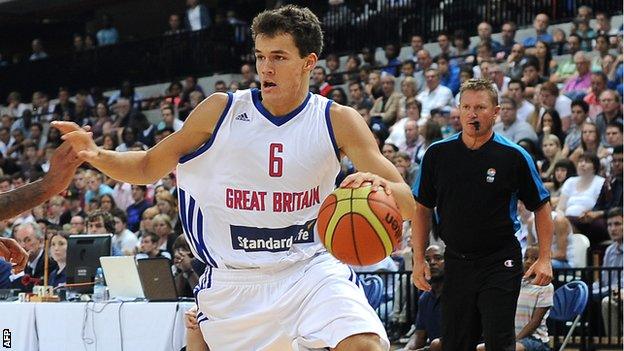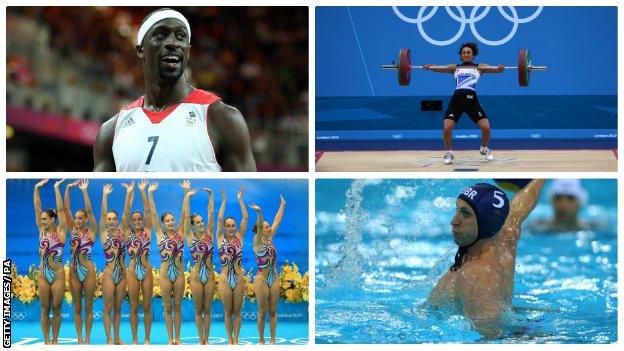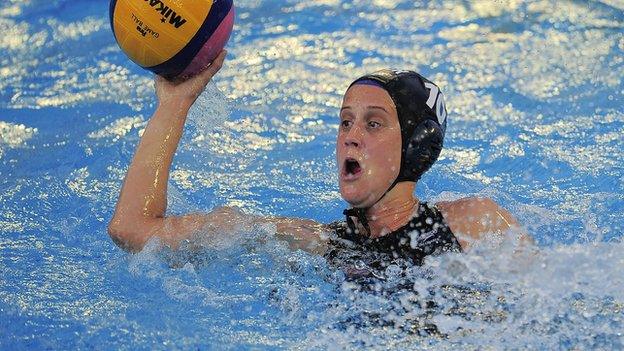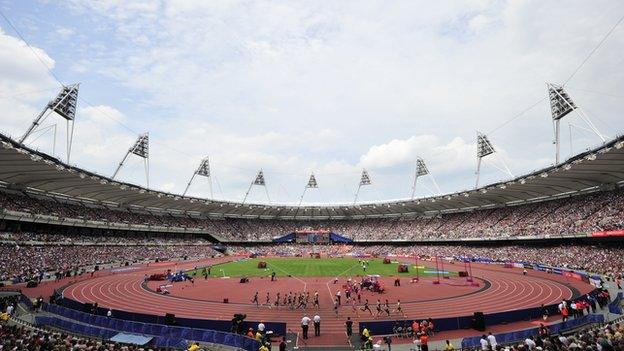UK Sport: Funding policy could be reconsidered
- Published
UK Sport to consult public on funding
UK Sport could be ready to reconsider its 'no compromise' approach to funding elite sport.
The government agency is to launch a public consultation for the first time to decide its future strategy.
UK Sport invests £100m of National Lottery and government money into high-performance sport each year, and its medals-based policy has underpinned Britain's recent Olympic and Paralympic success.
GB Olympic handball funding cut was 'gut-wrenching'
But there has been criticism of this method, and the review will be welcomed by sports such as basketball that have suffered funding cuts.
Others, though, will argue that meddling with a model that has seen the revival of British sporting fortunes is risky.
"We really do want to listen," UK Sport chief executive Liz Nicholl told the BBC. "We are not arrogant enough to think that we know how to do everything best.
"The questions that we need to ask now, of the nation, of the government, of our partners, are: 'What is it that they want UK Sport to be focused on? What is it they want UK Sport to deliver?'
"We will review what we hear from the consultation, we will refine our thinking and agree a direction of travel in February."
Great Britain's improved medal haul since 1996 | ||||
|---|---|---|---|---|
Olympic Games | Gold | Silver | Bronze | Total |
Atlanta 1996 | 1 | 8 | 6 | 15 |
Sydney 2000 | 11 | 10 | 7 | 28 |
Athens 2004 | 9 | 9 | 12 | 30 |
Beijing 2008 | 19 | 13 | 15 | 47 |
London 2012 | 29 | 17 | 19 | 65 |
UK Sport's funding criteria is currently based purely on performance and has resulted in Great Britain moving from 36th in the Olympic medal table at the 1996 Games in Atlanta to third at London 2012 with 65 medals.
Sports are judged on four and eight year periods or "pathways". Some emerging sports have asked for a longer 12-year period to give them more time to develop and improve, and this is now likely to be incorporated after the Rio Games in 2016.
However, there have been losers, too. In February, funding was controversially stopped for seven sports - including basketball, water polo and synchronised swimming - because they all stood little chance of winning medals at Rio or the Tokyo 2020 Games.
Handball and volleyball lost their funding in late 2012, leading to a complete closure of their programmes. The women's indoor volleyball team rose more than 60 places in the rankings and entered the world's top 20 during the four years leading into London, before winning a match at the Olympics.
Basketball is the second biggest team sport among 14-16 year olds in the UK, and is played by nearly 218,000 people each week, but between them, Britain's men's and women's teams managed only one win from 10 matches in London.
However, British Basketball accused UK Sport of discriminating against team and emerging sports and has urged a rethink of the strategy.
"We always listen to what sports are saying and give very careful consideration to whether that means we should be doing something differently," added Nicholl.
"We're hearing quite a few comments from team sports, particularly basketball, sports that are not funded by us in this cycle because they are more than eight years away from developing medal potential.
"And so, the questions we will be asking are: 'Should we dig deeper? Should we extend our remit? I think we are confident that we could do that this time round. We have the capacity to do it, the knowledge and the ability to be able to do that."
GB basketball 'future in doubt'
In August, Britain's men failed to qualify for the 2015 EuroBasket Championships amid claims the funding cuts had hampered preparations.
GB player Kieron Achara said members of the squad were living off only £15 per day, had to sleep in beds too short for them and were forced to take early-morning flights on budget airlines the day after late-night matches in order to save money.
NBA star Luol Deng said the sport in Britain was very close to collapsing after its £7m funding was cut and there have been doubts that British Basketball will be able to afford to send a women's team to next year's European Championships.
UK Sport has been accused of failing to recognise basketball's popular appeal among young people, while rewarding a number of so-called 'elitist sports', whose participants are largely drawn from the private school system, or which have small bases of participatory support.
For instance, rowing, sailing, equestrianism and modern pentathlon all had funding increased for the 2013-2017 period.
In February, the House of Lords' Olympic and Paralympic Legacy Select Committee reported that "the 'no compromise' approach of UK Sport has delivered medals for Team GB and has clearly improved top end performance".
It added: "This approach, however, has an inherent bias against team sports, and fails to help emerging sports, some of which, such as handball and volleyball, generated real enthusiasm at London 2012."
Funding cuts for some Olympic sports since 2012 | |||
|---|---|---|---|
2012 | 2016/2020 | % | |
Basketball | £0 (increased to £7m on appeal in 2013) | £0 | -100% |
Synchronised swimming | £4.3m | £0 | -100% |
Water polo | £4.5m | £0 | -100% |
Badminton | £5.9m | £5.7m | -4% |
Swimming | £21.4m | £20.8m | -3% |
In March, an all-party group of MPs reported that UK Sport's approach "risks the inadvertent disenfranchising of a whole segment of UK society by failing to back an elite team that can serve as a role model".
Nicholl suggests there may now be a shift in emphasis, with participation rates possibly considered when it come to funding.
"One of the points raised by our board is a strong view that we should aim to drive more impact from what we do," she said. "And the impact isn't just in creating the medals and the medallists. It is also through inspiring the next generation to participate in sport and promoting equality and diversity.
"Is it still about medals and medallists? Is it still about Olympic and Paralympic sports? Is it about non-Olympic sports? Do we dig deeper into 12-year pathways or do we stick with eight-year? Is there anything about the funding model and how we calculate how much it costs that needs to change?"
"It is important to refine ways of working and we only really have the opportunity to do that and the beginning of the Olympic cycle.
"Now is a critical time and it will be another four years before we look at this again."
- Published19 August 2014

- Published19 March 2014

- Published4 February 2014

- Published18 November 2013
